|
|
|
|
 |
More on LinguisticsLinguists study their own language and other ones too. Since they need to describe the pronunciations of words so that any linguist around the world can understand them, they developed an international phonetic system made up of symbols to represent sounds.
So, whether you speak Chinese, Arabic, or Swahili you would
know how to pronounce an "e" rotated 180 degrees:
Check out any dictionary—you'll see that they all have some kind of phonetic system to help you know how to pronounce unfamiliar words. Do you recognize these common words when they are spelled phonetically? I'm ready to check my answers. But what if you can't hear? Or see? Can you think of other ways to communicate thoughts and ideas? Check these out! Takla Makan Mummies | Mummies 101 | Digging into Language Resources | Transcript | Mummies Home Editor's Picks | Previous Sites | Join Us/E-mail | TV/Web Schedule About NOVA | Teachers | Site Map | Shop | Jobs | Search | To print PBS Online | NOVA Online | WGBH © | Updated October 2000 |